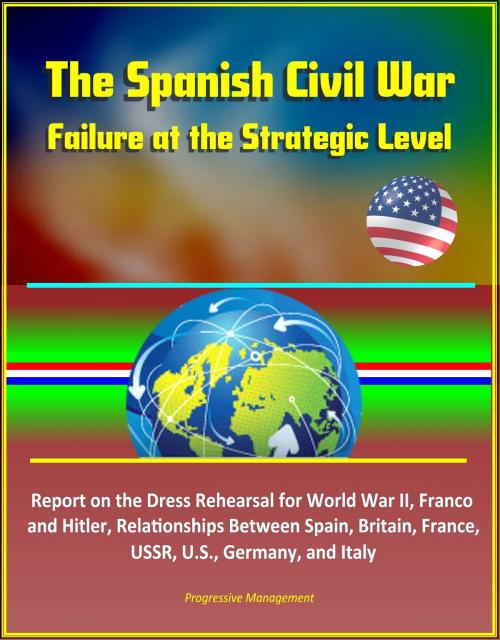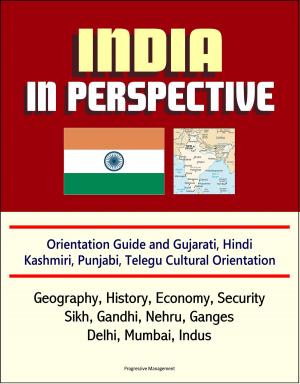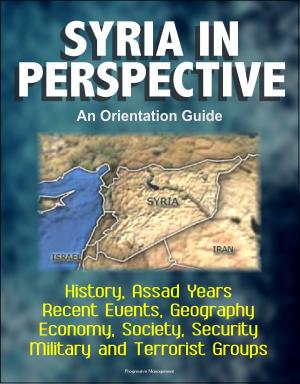The Spanish Civil War: Failure at the Strategic Level - Report on the Dress Rehearsal for World War II, Franco and Hitler, Relationships Between Spain, Britain, France, USSR, U.S., Germany, and Italy
Nonfiction, History, Spain & Portugal, Military, World War II| Author: | Progressive Management | ISBN: | 9781370372416 |
| Publisher: | Progressive Management | Publication: | October 12, 2017 |
| Imprint: | Smashwords Edition | Language: | English |
| Author: | Progressive Management |
| ISBN: | 9781370372416 |
| Publisher: | Progressive Management |
| Publication: | October 12, 2017 |
| Imprint: | Smashwords Edition |
| Language: | English |
The Spanish Civil War (1936-1939) was a military and political struggle between Left and Right-wing factions in Spain. Despite the likelihood the Spanish Civil War would lead to a larger war in Europe, pro-democracy countries chartered a course of nonintervention and isolationism. It remains one of the most controversial periods in the Twentieth Century as it is often described as the dress rehearsal for World War II. First, this research paper will review the complex political environment in Spain before the war resulting in the outbreak of the Civil War. The second part of this paper will focus on the international political environment and the effects it had on the Spanish Civil War. It will evaluate foreign policies and the strategic-level relationships between Spain, Britain, France, the USSR, the United States, Germany, and Italy. Finally, the paper will conclude with some lessons learned from the War.
The Spanish Civil War (1936-1939) was one of the most defining periods in the 200h Century. At the most basic level, it was a conflict between revolutionary and governmental forces. It was a conflict that had been festering in Spain for over a century, but a conflict that would have far wider ramifications.1 The war was not only a civil war between opposing ideologies, it was a war that altered the course of world events forever. As many have said, the Spanish Civil War turned out to be the dress rehearsal for World War II.
Domestic issues that led up to the Spanish Civil War rivaled the international politics that made the war as complex as any in modern day history. The first part of this research paper will be spent on the issues leading up to the war, i.e., why the war started, while the second part of the paper will examine the politics of foreign intervention and the lessons we can learn.
The Spanish Civil War (1936-1939) was a military and political struggle between Left and Right-wing factions in Spain. Despite the likelihood the Spanish Civil War would lead to a larger war in Europe, pro-democracy countries chartered a course of nonintervention and isolationism. It remains one of the most controversial periods in the Twentieth Century as it is often described as the dress rehearsal for World War II. First, this research paper will review the complex political environment in Spain before the war resulting in the outbreak of the Civil War. The second part of this paper will focus on the international political environment and the effects it had on the Spanish Civil War. It will evaluate foreign policies and the strategic-level relationships between Spain, Britain, France, the USSR, the United States, Germany, and Italy. Finally, the paper will conclude with some lessons learned from the War.
The Spanish Civil War (1936-1939) was one of the most defining periods in the 200h Century. At the most basic level, it was a conflict between revolutionary and governmental forces. It was a conflict that had been festering in Spain for over a century, but a conflict that would have far wider ramifications.1 The war was not only a civil war between opposing ideologies, it was a war that altered the course of world events forever. As many have said, the Spanish Civil War turned out to be the dress rehearsal for World War II.
Domestic issues that led up to the Spanish Civil War rivaled the international politics that made the war as complex as any in modern day history. The first part of this research paper will be spent on the issues leading up to the war, i.e., why the war started, while the second part of the paper will examine the politics of foreign intervention and the lessons we can learn.















